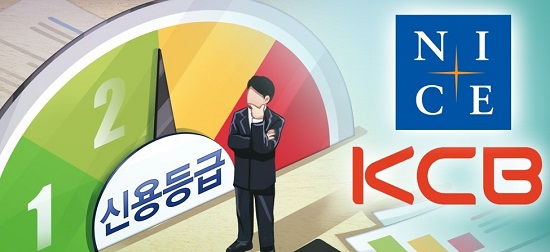Since 2021, instead of the credit rating system, which divided individual credit into 1-10 grades, a credit score system of 1,000 points was introduced in all financial sectors. We summarized the contents introduced by the Financial Supervisory Service, Nice Evaluation Information, and KCB on what to pay attention to in order to manage your credit score well.
 |
| ▲ An example showing the change in credit score inquiry of a personal credit rating company. From 2021, a 1,000-point credit score system was introduced in all financial sectors. (Photo Credit=Yonhap News) |
With the introduction of the credit score system, it is expected that the threshold effect of those who received lower grades due to slight differences and were restricted by loans, etc. will be eased, and more sophisticated credit review will be possible. Credit rating agencies Nice Rating Information and Korea Credit Bureau (KCB) each developed and applied a new rating model in line with the introduction of the credit score system.
Registering income certificate, communication fee, and management fee payment details
Just because you have a lot of income or wealth doesn’t mean your credit score will go up unconditionally. Basically, this is because credit evaluation is not about the amount of money, but rather based on how you have done money transactions so far.
However, an individual may request that the IRS reflects it in the’non-financial evaluation’ item while additionally submitting an income certificate, etc. They show their ability to repay their debts and receive additional points.
Telecommunication charges, health insurance premiums, national pension, and utility bills (city gas, water, electricity, and administrative expenses) can also help to raise your credit score. In particular, this method is useful for students and housewives who have insufficient credit history.
To register non-financial information, you can visit the homepages of’Nice Gkimmi’ and’All Credits’ or use the simple submission support service provided by fintech companies.
Loans pay off from high interest rates, loans for loans are carefully
It is better to pay off loans with higher interest rates. This is because credit rating agencies consider the type of loan, business right, interest rate level, and repayment ratio, and reflect negatively on credit ratings for high-risk loans.
For the same reason, we recommend using loans carefully. Loan information received from institutional financial institutions as well as lenders is automatically reflected in the evaluation.
You don’t have to be afraid of all loans. The loan itself is a negative evaluation factor, but on the contrary, if the loan is paid off well, it has a positive effect on the credit score and credit transaction performance is accumulated.
Since negative bankbooks are reflected as having a debt burden as much as the limit, removing them if not used will help increase your credit score.
Avoid even a small amount of arrears… No arrears of taxes
Even small amounts of 100,000 won overdue repayment should be avoided as much as possible. Even if all overdue money is paid off, the record remains for up to five years, which adversely affects credit ratings.
If there are multiple overdue cases, it is better to start with the old ones. The longer the delinquency period, the number of arrears, and the amount of arrears, the more negative the credit rating.
Information on delinquent payment of taxes and utility bills registered with the Korea Credit Information Service and information on delinquent student loans by the Korea Scholarship Foundation also affects your credit score, so you need to manage it well.
Consistently use credit and debit cards, check my credit score
Consistent use of credit or debit cards without delinquency can help increase your credit score. This is because it is a sign that you are living a sound credit life.
However, credit card cash services and credit card loans correspond to loans with relatively high interest rates, so it is better not to use them frequently. Excessive use of installment services is also bad for credit ratings.
It is a misconception that if you search a lot of credit information, your credit score will drop. Rather, the FSS and credit rating agencies recommend that you check and manage your credit score on a regular basis.
Their credit information calculated by each credit rating agency can be checked on the websites of’Nice Ji Kimi’ and’All Credits’. Toss, Kakao Pay, and Bank Salad also provide credit score inquiry services in partnership with these rating companies.
The parties may request or raise an objection to the rating agency for explanation of the rating results.
Copyright holder (c) Daily Good News. Unauthorized reproduction-redistribution prohibited
